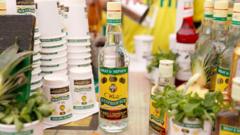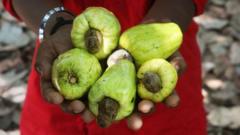The rum industry in Jamaica faces internal conflict as producers debate the implications of new geographical indication regulations that prohibit ageing rum overseas, with significant impacts on authenticity and business operations.**
Legal Debate Over Authenticity of Jamaican Rum Heats Up**

Legal Debate Over Authenticity of Jamaican Rum Heats Up**
The Caribbean island's rum producers clash over what defines Jamaican rum as new regulations restrict ageing practices.**
The Caribbean island of Jamaica is at the heart of a spirited legal debate regarding the authenticity of its iconic rum. As the country’s cultural identity heavily intertwines with rum production, industry insiders are now questioning what it truly means for a rum to be labeled "Jamaican."
The discussion intensified after amendments to the Geographical Indication (GI) designation for Jamaican rum were approved by the Jamaica Intellectual Property Office (JIPO) last October. The 2016 GI framework, aimed at preserving the quality and identity of Jamaica's rum, now prohibits the practice of ageing rum overseas, much to the discontent of some producers.
The Spirits Pool Association (SPA), representing six rum distilleries, stood at the forefront of the call for tighter regulations, arguing that a more robust GI is essential for recognition in key markets like the EU and US. They emphasize that this would not only safeguard the premium status of Jamaican rum but also enhance its value and market presence.
However, one of Jamaica's largest rum producers, National Rums of Jamaica (NRJ), which oversees Long Pond and a significant share of Clarendon, holds a contrasting opinion. Their business model hinges on bulk rum exports and subsequent ageing overseas—a practice that the new GI regulations now forbid. NRJ argues that such rum should still qualify as Jamaican, pointing to a long history of overseas ageing.
As tensions mount, NRJ has planned to challenge the ruling in a hearing set for April 28. Critics of the SPA’s stance argue that the amendments threaten the viability of local businesses, particularly the strategic interests of foreign stakeholders within NRJ. Christopher Gentles, the SPA’s general manager, suggests that true commitment to Jamaican rum requires ageing it domestically, reinforcing the integrity of its heritage and quality.
Additionally, this debate finds parallels in Barbados, where rum producers are also grappling with the challenges of establishing a GI. Much like their Jamaican counterparts, Barbados distilleries face opposition from a single entity worried about the restrictions on overseas ageing.
With the SPA aspiring to apply for the EU's Protected Geographical Indication classification pending JIPO's proceedings, conversations for a potential compromise continue, albeit with lingering doubts from both sides. This legal tussle not only holds economic stakes but also strikes at the heart of national pride connected to a product deeply rooted in Jamaica’s history.
In the wake of the October ruling, local media, such as The Gleaner, have voiced support for the JIPO decision. They suggest that preserving the authenticity of uniquely Jamaican products is paramount in a landscape where foreign entities increasingly vie for control over iconic brands.
The discussion intensified after amendments to the Geographical Indication (GI) designation for Jamaican rum were approved by the Jamaica Intellectual Property Office (JIPO) last October. The 2016 GI framework, aimed at preserving the quality and identity of Jamaica's rum, now prohibits the practice of ageing rum overseas, much to the discontent of some producers.
The Spirits Pool Association (SPA), representing six rum distilleries, stood at the forefront of the call for tighter regulations, arguing that a more robust GI is essential for recognition in key markets like the EU and US. They emphasize that this would not only safeguard the premium status of Jamaican rum but also enhance its value and market presence.
However, one of Jamaica's largest rum producers, National Rums of Jamaica (NRJ), which oversees Long Pond and a significant share of Clarendon, holds a contrasting opinion. Their business model hinges on bulk rum exports and subsequent ageing overseas—a practice that the new GI regulations now forbid. NRJ argues that such rum should still qualify as Jamaican, pointing to a long history of overseas ageing.
As tensions mount, NRJ has planned to challenge the ruling in a hearing set for April 28. Critics of the SPA’s stance argue that the amendments threaten the viability of local businesses, particularly the strategic interests of foreign stakeholders within NRJ. Christopher Gentles, the SPA’s general manager, suggests that true commitment to Jamaican rum requires ageing it domestically, reinforcing the integrity of its heritage and quality.
Additionally, this debate finds parallels in Barbados, where rum producers are also grappling with the challenges of establishing a GI. Much like their Jamaican counterparts, Barbados distilleries face opposition from a single entity worried about the restrictions on overseas ageing.
With the SPA aspiring to apply for the EU's Protected Geographical Indication classification pending JIPO's proceedings, conversations for a potential compromise continue, albeit with lingering doubts from both sides. This legal tussle not only holds economic stakes but also strikes at the heart of national pride connected to a product deeply rooted in Jamaica’s history.
In the wake of the October ruling, local media, such as The Gleaner, have voiced support for the JIPO decision. They suggest that preserving the authenticity of uniquely Jamaican products is paramount in a landscape where foreign entities increasingly vie for control over iconic brands.

















